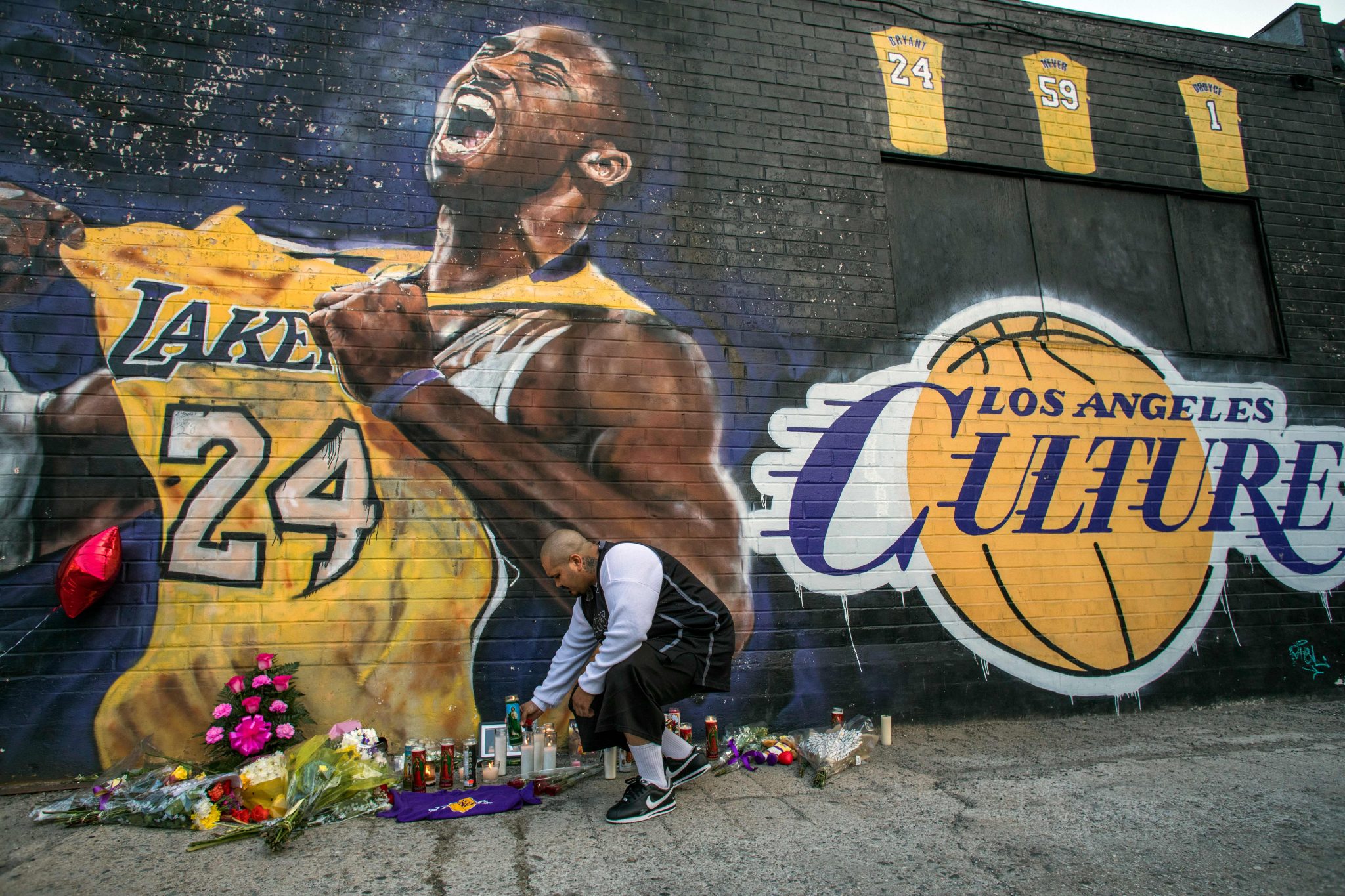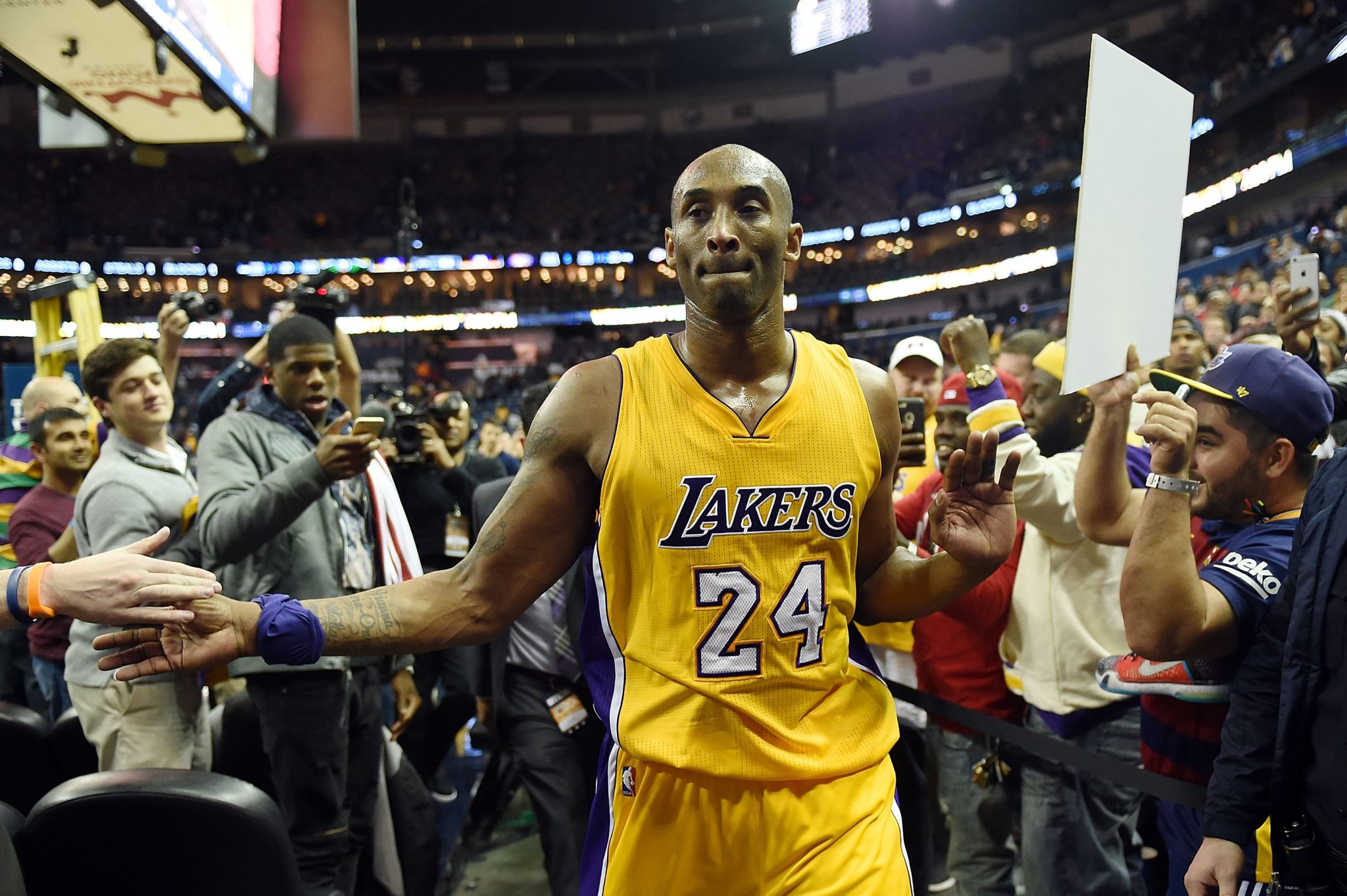

Luis Villanueva lights a candle in front of a Kobe Bryant mural in downtown Los Angeles on January 26, 2020. (Photo by APU GOMES/AFP via Getty Images)
Kobe Bryant and the Los Angeles Lakers are among the reasons I’m a proud Angeleno.
Bryant’s death on Sunday came to me as much of a shock as to many around the world. I first heard of the news of his passing while at work on Fifth Avenue in front of the NBA store in New York City, across the country from where I first learned about who Kobe was.
If there is something my siblings and I have in common aside from our DNA is our affection for Kobe Bryant and the Lakers. After hearing the sad news of Kobe’s death, we spent the whole day texting over our sibling chat about how much he meant to us.
For me, becoming a Los Angeles Lakers fan was part of my immersion into American culture. It is part of my upbringing as an Angeleno as it was for my family.
My parents brought me to the U.S. from México in 1998. They decided to settle in Los Angeles, two years before the Lakers won the 2000 championship. That time was embedded in my mind because it was the first major event I witnessed while living in the U.S. Basketball was a foreign sport to me. All I knew about the sport was Michael Jordan, the Chicago Bulls, and Space Jam. I remembered being shocked that my new elementary school had more space for basketball courts than a soccer field. Moreover, the basketballs were in great shape. Make no mistake though: basketball and soccer ruled the playground, but the cool kids hung out by the courts. I immediately wanted to hang out with them, but I spoke little English and wore off-brand tennis shoes. I stood out like a sore thumb.
My immigrant parents didn’t have the luxury to buy brand clothes for my siblings and me, but they loved taking us places. Since they didn’t have the money to take us to the theme parks Southern California had to offer, a trip to the Universal CityWalk was just as good as being inside Universal Studios Hollywood. It was the same for when it came to major league sports games.
My dad would take me to the Rose Garden in Exposition Boulevard, which was in the same vicinity as the Los Angeles Memorial Coliseum, which was the venue for important soccer games. When the Staples Center opened a year after I arrived to the states, my family took a trip downtown to see the new stadium that would house many professional league teams. Among those teams were the Los Angeles Lakers. I did not know then, but I would soon become a fan for life.
I grew up in South Central LA, a 15-minute car ride away from the Staples Center.
We lived in an apartment building with Mexican, Guatemalans, and Salvadoran immigrants.
The building’s supervisor would bring out a television set to the building’s backyard whenever there was any major sports event so that the whole building could enjoy it. No one would complain about this.
I remember watching the final game of the 1999-2000 NBA season with my family and neighbors. When the buzzer went off and the Lakers had won their first title in over a decade, there was a roar all over the neighborhood. There were cars honking and fireworks in the sky. We ran out to the streets to cheer in happiness. I yelled, “¡Ganaron los Lakers!” every time a car would pass by. I talked to neighbors I had never met before. We were able to see the lights from the Staples Center celebrations over house roofs and palm trees. Although a riot broke out at the Staples Center that night, there was a sense of civic pride and belonging, something I was lacking as an immigrant myself.
I saw my parents indulge in happiness as if they had been lifelong Lakers fans. It was one of the few times I saw them happy and it was all thanks to the Lakers, Shaquille O’ Neal and a young Kobe Bryant.


Kobe Bryant leaves the court following a game against the New Orleans Pelicans on February 4, 2016 in New Orleans, Louisiana. (Photo by Stacy Revere/Getty Images)
The following year, the Lakers had made it to the finals again. All I knew was that Kobe had the hottest shoe out. The Kobe Two was a futuristic silver show, minimalist in design—it looked like the new Tesla truck. I was now in middle school and everyone had that shoe. I waned it too. My mom saw the price for authentic Kobe Two’s and refused to pay full price for the silver space shoes. She took me to The Santee Alley in Downtown LA where you were able to find the knock-off version.
The Lakers won the title for the second time in a row in 2001. Shaq and Kobe were a dynamic duo. The celebration was similar. There was euphoria in the air. The lights from the Staples Center lit up the sky again as if it was a call for a superhero. There was LA pride all over the city. You could hear it on the radio, see it on TV, or live it in your neighborhood. Cars flew Lakers flags or wore Lakers bumper stickers. Many of my friends owned a Lakers jersey. The city was better prepared for the second win. This would be the last celebration before 9/11.
In 2002, the Lakers gave Angelenos something to celebrate again after almost a year of news about war and terrorism. Kobe and Shaq united us once again. They were now household names at my parent’s home. We had random Lakers paraphernalia. Everyone in our building at this point owned something with the Lakers logo. There was a sense of entitlement as if we collectively as a city deserved to be winners all the time. “Back to back to back” was a short slogan depicting the three consecutive wins.
In 2003, Kobe was arrested on a sexual assault accusation. This year was also marked by my parent’s divorce. I was too young to understand both events happening at that time. That year, the Lakers didn’t make it to the finals and my mom decided to move away from LA. In 2004, Shaq left the Lakers and the magic of the dynamic duo was gone with him—or so we thought. In 2006, he scored 81 points over the Toronto Raptors. This was one of the highest points ever scored by a player in one single game. During the same year, I graduated from high school and a new chapter in my life was about to start.
In 2008, my dad was arrested by Immigration and Customs Enforcement and he was deported after a brief time in jail. I didn’t see him for the next eight years. That same year, Paul Gasol joined the Lakers. In 2009, Paul Gasol, Derek Fisher, and Kobe Bryant brought home the trophy once again. They were the first basketball team the Obama White House hosted at a time president Obama fast-tracked deportations of undocumented immigrants. Kobe was named Most Valuable Player for the first time. I did not see my parents celebrate this time. I was too far from the Staples Center to see the lights in the sky. A sports riot broke out at the Staples Center for the first time in LA in over 9 years.
In 2010, the Lakers won again. This time I celebrated with friends as an adult, away from the Staples Center, as riots seemed like a tradition. According to a Times article, a riot was broken up by the Los Angeles Police Department by 11 p.m. Celebrations were no longer pure. I had to find my own way to make these celebrations my own.
I watched Kobe’s last game in 2016 at a bar close to the Staples Center with my close friends. I remember thinking about the first time I saw him win in 2000 and how different my life was then compared to 16 years later. We watched Dear Basketball, the animated short film written and narrated by Kobe Bryant, and we cheered at the screen once it ended. Kobe gave his final speech and just like that it was an end to an era. A chapter of my life that once included my parents in one place.
The same day after learning of Kobe’s passing, I called my dad in México. We reminisced on that first championship in 2000. We quickly talked about that night of celebration and Kobe’s impact in LA. I had a conversation with my dad about something that we shared in common, our first major event we witnessed together in the U.S.
Kobe and the Lakers made me part of something when I felt I had nothing. They gave a reason to be a proud of being an Angeleno. We overcame milestones together and opened new chapters around similar times. They are part of my American story even though I’m just a simple fan.
Thank you, Kobe! Thank you, Lakers!
***
Juan Diego Ramírez is the author of Corre La Voz. He tweets from @juandr47.


